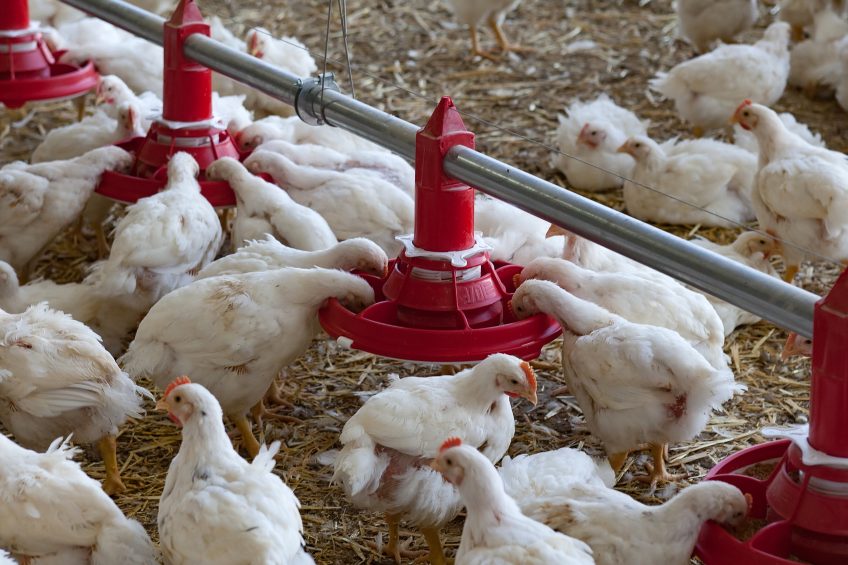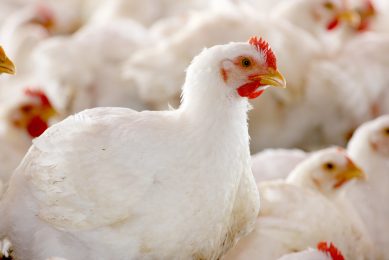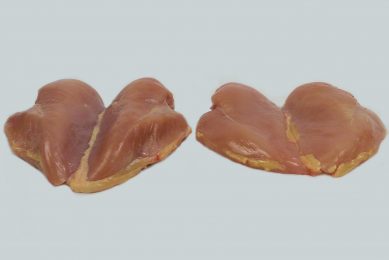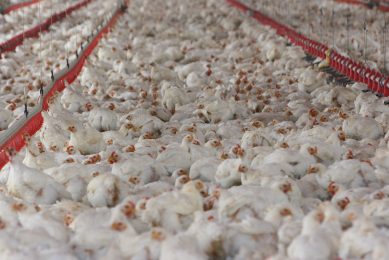Protease’s role in alleviating necrotic enteritis losses

Necrotic enteritis has been estimated to affect up to 40% of commercial broiler flocks and is believed to cost the industry roughly $0.05 per broiler in the United States. On average, necrotic enteritis negatively impacts the global poultry industry by over $2 billion every year. Enzymes can be an effective solution when looking at necrotic enteritis prevention measures.
Many countries today have banned the use of antibiotics in animal feed due to consumer concerns of the development of antibiotic resistant bacteria, and the withdrawal of antibiotic use in feed is one of many predisposing factors for necrotic enteritis. This decrease in antibiotic use has resulted in negative impacts on bird average daily gains and feed conversion ratios (FCR), as well as an increase in the number of confirmed cases of necrotic enteritis. Consequently, this has resulted in an increase in the usage of therapeutic antibiotics to treat necrotic enteritis after it has occurred in the animal.
Necrotic enteritis at-a-glance
Necrotic enteritis is caused by Clostridium perfringens, which is a spore-forming, anaerobic bacterium. The spores produced by this bacterium are prevalent throughout the environment and can be found in soil, water, faeces, feed and poultry litter. In addition, small amounts of C. perfringens are naturally present in the intestines of healthy birds. The ‘good’ bacteria in a healthy bird keep the population of C. perfringens at an insignificant level. However, when conditions in the intestinal tract change, the population of C. perfringens can increase and necrotic enteritis may appear.
Necrotic enteritis will typically last in a flock for 5 to 10 days and can cause mortality rates up to 50%. This disease commonly affects broilers 2- to 5-weeks old, and turkeys 7- to 12-weeks old. It may present itself in either a clinical or subclinical form (Figure 1). The symptoms of the clinical form include ruffled feathers, depression, immobility, diarrhoea, dehydration and lack of appetite. As a result of the clinical form, mortality rates are high and birds can die within a few hours. Conversely, the symptoms of the subclinical form of necrotic enteritis are not as recognisable. Birds affected by the subclinical form may show signs of reduced feed intake and reduced performance, but no peak in mortality is witnessed. As a result, birds suffering from subclinical necrotic enteritis often go untreated due to a lack of diagnosis, resulting in large economic losses for the producer.
Figure 1 – Clinical and sub-clinical symptoms of necrotic enteritis.

There are several existing predisposing factors for necrotic enteritis which need to be addressed in order to understand ways the disease can be prevented. These predisposing factors include disease exposure, individual feed ingredients, environmental stress and a decrease in the use of in-feed antibiotics.
Protease: Optimising protein digestibility
One approach to take towards tackling necrotic enteritis is through the inclusion of a high-quality protease feed enzyme in the formulated feed. Protease enzymes can reduce the risk of necrotic enteritis by improving digestion and absorption of nutrients.
The addition of a high-quality protease, such as Cibenza DP100 enzyme feed additive from Novus International, allows for maximum flexibility in dietary formulations, and helps optimize dietary energy and protein digestibility. The product is an intrinsically heat-stable, broad-spectrum protease that complements animals’ endogenous enzymes to hydrolyse less-digestible proteins in animal feeds. Research has demonstrated that the product can enhance dietary protein digestibility, support animal performance and reduce feed cost when compared to other protease sources.
Lower total protein inclusion levels needed
Inclusion of the protease enzyme product helps improve digestion of protein in feed ingredients, thereby allowing lower inclusion of total protein when formulating poultry diets. Secondly, due to the increased digestion of protein, a lesser amount of undigested protein is passed into the hindgut. This consequently reduces the proteolytic fermentation that can lead to formation of potentially toxic end products, such as biogenic amines, phenolic components, ammonia and other volatile components, which are detrimental to the health and production performance of poultry.
As the product is effective in reducing the amount of undigested protein, it leaves less protein available for C. perfringens growth in the gut, which may lead to a lower incidence of necrotic enteritis (Figure 2).
It is important to be proactive in controlling the proliferation of necrotic enteritis. Numerous preventive measures are suggested to reduce the initial risk for contracting the disease, such as the use of good management practices, vaccines, probiotics, organic acids and essential oils. When intestinal health is emphasised, there is a reduced risk for C. perfringens growth and necrotic enteritis development within the bird. Cibenza DP100 provides the solution needed to support optimal gut health, animal performance and welfare, as well as producer profitability.
Author: Dr Ajay Bhoyar, senior manager – global poultry marketing, Novus International
Join 31,000+ subscribers
Subscribe to our newsletter to stay updated about all the need-to-know content in the poultry sector, three times a week. Beheer
Beheer




![Improved performance and stronger egg shells are some of the traits enhanced by chelated trace minerals. [Photo: World Poultry]](https://www.poultryworld.net/app/uploads/2021/04/001_419_rb-image-2724060-389x260.jpeg)
 WP Admin
WP Admin  Bewerk bericht
Bewerk bericht